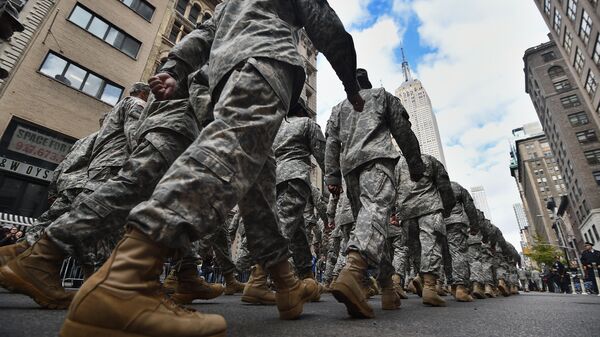Incredible as it may seem, official reports brush aside the idea that war itself has anything to do with the problem, American activist and author David Swanson notes.
"Remarkably, the subject of war, their role in war, their thoughts about the supposed justifications (or lack thereof) of a war, never come up," Swanson wrote in his article for Information Clearing House.
The psychiatric studies and mass media reports are being focused on various "factors to blame" from "prior suicidality" to "poverty." However, they tell us virtually nothing, according to Swanson.
"Perhaps their goal isn't to tell us something factual so much as to shift the conversation away from why war causes murder and suicide, to the question of what was wrong with these soldiers before they enlisted," the author remarked.
Furthermore, they are also higher for those who've taken part in combat operations than for those who've served in the military but never participated in combat. Swanson pointed out that they are "even higher for those who've been in even more combat," and usually higher for ground troops than for pilots.
The crux of the matter is that going to war, which can be regarded as committing a state-sanctioned murder, increases criminal violence in the non-combat environment. And this fact shifts our attention directly to the problem of war, not to the problem of which fraction of returning troops to offer a "modicum of reorientation into nonviolent life," the activist noted.
"But if you accept that war is necessary, and that most of the funding for it must go into profitable weaponry, then you're going to want to both identify which troops to help and shift the blame to those troops," Swanson underscored.
Commenting on the problems of violence and suicide rates among US Army veterans, the authors of academic studies are inclined to focus on the troops' background, turning a blind eye to the fact that these servicemen had one important shared experience called "war."
Some American researchers even go so far as to claim that this is a very simplistic approach to the problem to explain military suicide by "war-is-hell theory."
"The impact of war on mental state is never discussed," Swanson stressed.
What is then the real reason of the skyrocketing suicide rates among US combat veterans?
"The answer is, I think, the same as the answer to the question of why the topic is so studiously avoided. The answer is summed up in the recent term: moral injury. You can't kill and face death and return unchanged to a world in which you are expected to refrain from all violence and relax," the US author underscored.
"And returning to a world kept carefully oblivious to what you're going through, and eager to blame your demographic characteristics, must make it all the more difficult," he added.




